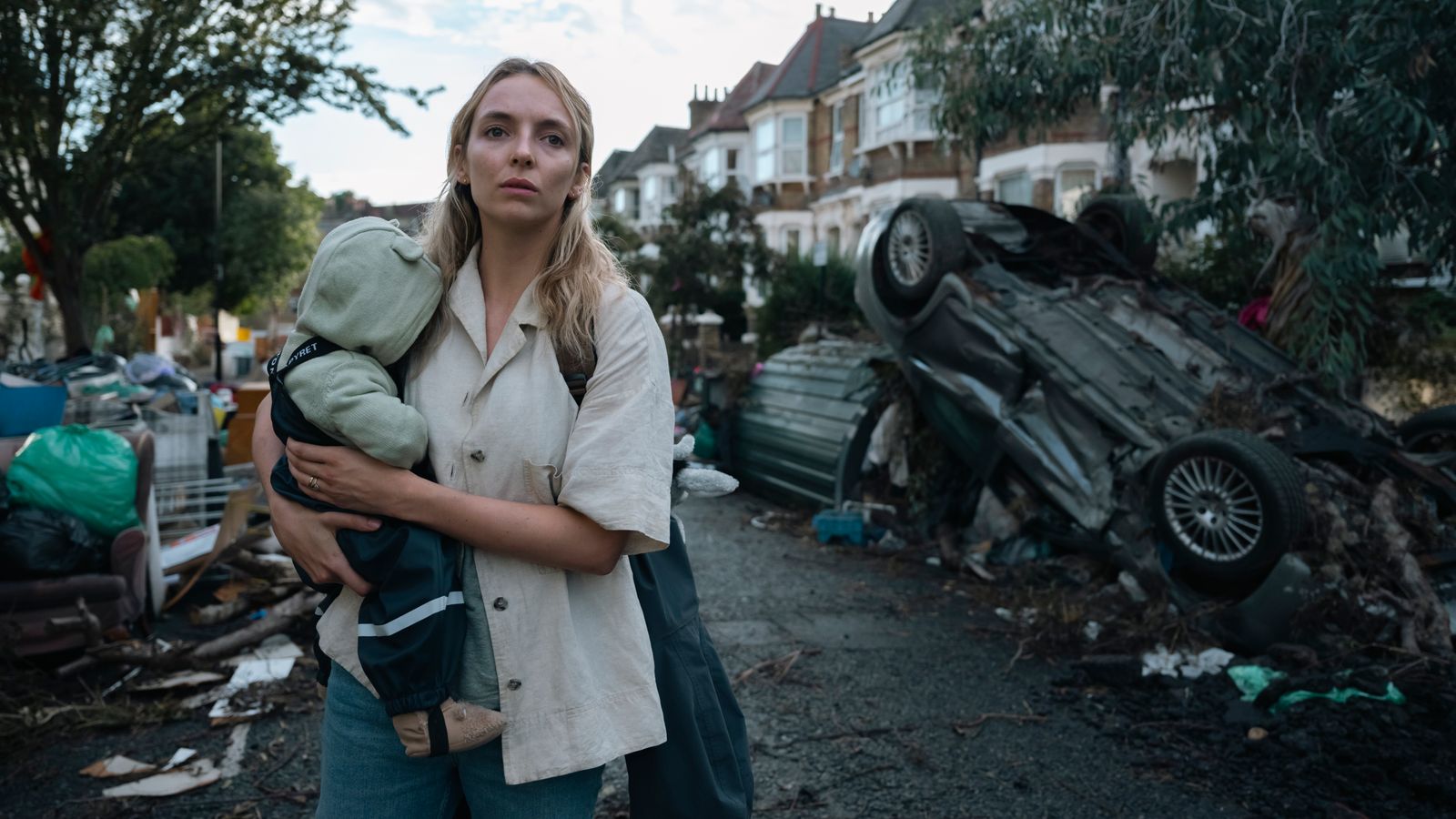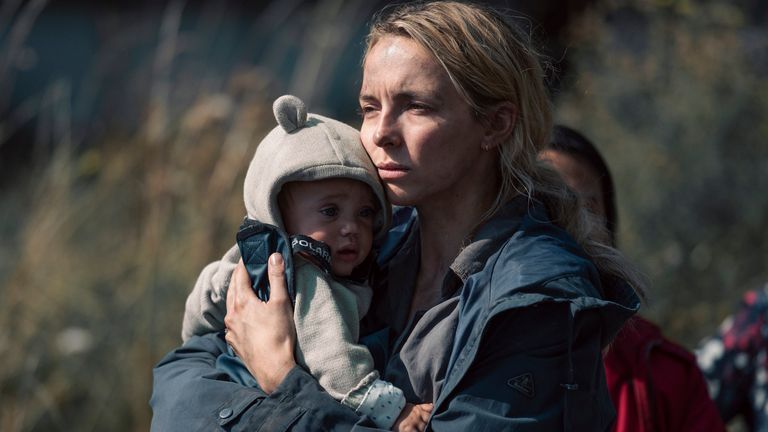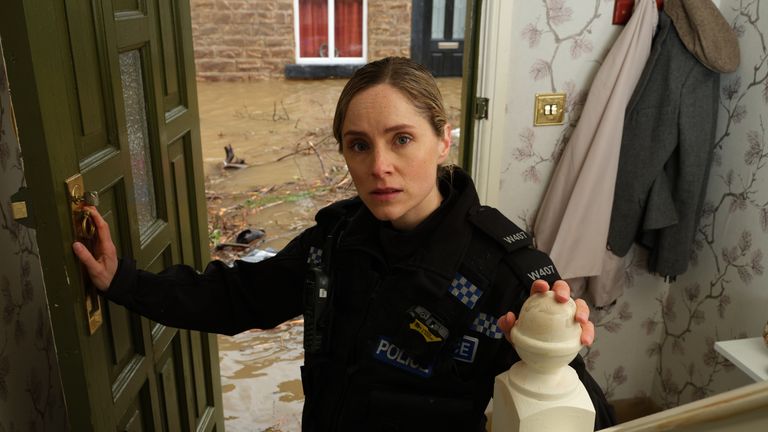First-time mothers battling apocalyptic flooding – it’s a storyline we’d like to confine to the realms of fantasy drama – but the author of The End We Start From says it’s a case of fiction becoming reality.
Megan Hunter tells Sky News: “It was the dystopian future novel. But now when people talk about the film, they talk about the present moment. It doesn’t really feel so future-orientated anymore unfortunately, it feels more relevant in a directly contemporary way.”
The novel, which she wrote in 2017, has been made into a film starring Jodie Comer as the nameless female protagonist fighting to survive in a waterlogged London.
Hunter says now, just six years on from finishing the book, “it feels a bit more like that is happening here.”
She adds: “There was that sense of, this isn’t something that happens to other people elsewhere, you know, far away. This is something that could happen here.”
The book was partly inspired by an out-of-print anthology of creation mythology she had on her bookshelf “about different ways people around the world have thought about how the world began and also how the world might end”.
With potential End Times being a pretty big plot point to digest, Hunter explains she brought together the universal – “our relationship to the world – to water, nature and the planet over thousands of years of human thought” – with a very personal story of “one woman in London making jokes about Match Of The Day”.
A mother to two young children herself, she says: “Watching a lot of disaster films I’d seen in the past, I didn’t feel that those characters were that relatable to me. They didn’t feel three-dimensional. I really wanted these people to feel completely real.
“We see the woman breastfeeding the baby. We see all of this kind of intimacy, this kind of closeness between people, and to bring that together with the much bigger picture, this much more global scenario. It brings it home.”
Hunter says by telling the story this way it becomes “very present, very real” and “very hard to turn away”.
We can feel ‘stifled’ by fear
The film’s star, Jodie Comer, tells Sky News she recognises the dilemma of wanting to close your eyes to the climate catastrophe.
“I think we all feel incredibly overwhelmed by it is my worry. You know, I think it can be very scary. And I think as a result of that, we can feel stifled and not know what it is that we can do.”
The film’s director, Mahalia Belo, hopes the movie could encourage those in power to sit up and take note.
“The feeling is that it’s inevitable to some extent, unless some change happens and unless people who have some ability to make change actually really listen to what experts are saying and basically make sure that we aren’t living in a challenging state in the future.
“Everybody knows we’re on an island. Sea levels will rise at some point. You know what’s going to happen.”
Read more:
The Traitors finalists on the ultimate betrayal
Inside the fly farm breeding millions of flies for food
Meanwhile, Sophie Rundle, the lead star of ITV drama After The Flood says the whole point of art is to reflect the world around us.
Northern communities left ‘decimated’
She plays heavily pregnant PC Jo Marshall in the police procedural, where again we see a community left reeling by extensive flooding.
Rundle tells Sky News: “A show purely about climate change might be quite hard to watch or might be quite isolating – it’s such an enormous conversation that we need to be having…
“I think people can be overwhelmed by headlines. And what do you do? Where do you begin? When do you begin talking when you see wildfires and flooding…
“How do we distil that conversation down into a human drama that we are comfortable with? Perhaps comfortable is the wrong word but is accessible to us.”
Click to subscribe to Backstage wherever you get your podcasts
With the climate crisis storyline working away behind the scenes, Rundle says the show can focus on the effects such catastrophes might have on society.
“What is the impact on you and your neighbours and the people on the street? On the people in your community? That’s what we are seeing happening, especially in smaller communities up in the north, towns are being decimated. There is no infrastructure in place to protect them. So, what does that world look like?”
‘Light in the darkness’
She credits the show’s writer, Mick Ford, with telling the story in a way that makes people think while still enjoying the ride.
“He draws this community, this collective of people and says, ‘There’s this huge flood, what happens next?’ And I think that’s palatable for people and that’s a way into this conversation while still being entertaining and still being exciting and thrilling.
Click to subscribe to ClimateCast wherever you get your podcasts
For all the doom and gloom around the future of the planet, such cultural explorations of the climate crisis in TV and film undoubtedly raise awareness and open up the conversation – small but necessary steps to making change.
Looking to the future, the author of The End We Start From remains optimistic.
“I think if we feel hopeless, then it can feel like there’s nothing that can be done. It can feel like a stuck end position. So, I do believe in having hope and continuing to look for the light in the darkness.”
The End We Start From is in cinemas now and After The Flood is on Wednesdays at 9pm on ITV1 or all there to stream on ITVX.




